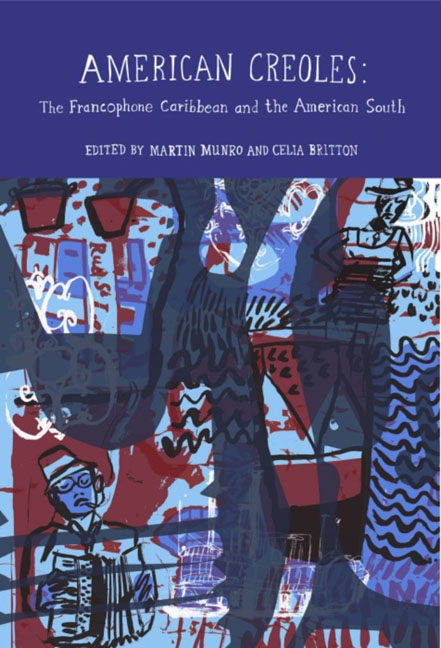Book contents
- Frontmatter
- Contents
- List of Illustrations
- Acknowledgements
- Introduction
- Creolizations
- Music
- Intertextualities: Faulkner, Glissant, Condé
- Go Slow Now: Saying the Unsayable in édouard Glissant's Reading of Faulkner
- Édouard Glissant and the Test of Faulkner's Modernism
- The Theme of the Ancestral Crime in the Novels of Faulkner, Glissant, and Condé
- An American Story
- Notes on Contributors
- Index
The Theme of the Ancestral Crime in the Novels of Faulkner, Glissant, and Condé
from Intertextualities: Faulkner, Glissant, Condé
- Frontmatter
- Contents
- List of Illustrations
- Acknowledgements
- Introduction
- Creolizations
- Music
- Intertextualities: Faulkner, Glissant, Condé
- Go Slow Now: Saying the Unsayable in édouard Glissant's Reading of Faulkner
- Édouard Glissant and the Test of Faulkner's Modernism
- The Theme of the Ancestral Crime in the Novels of Faulkner, Glissant, and Condé
- An American Story
- Notes on Contributors
- Index
Summary
William Faulkner, Édouard Glissant and Maryse Condé all come from that part of the world that we can define as the American Tropics, and therefore share a common history of plantation slavery. Within that history, however, they occupy very different positions – Faulkner as the descendant of slaveowners, Glissant and Condé as the descendants of slaves. In addition, the American South and the Caribbean have very different attitudes towards the question of racial mixing, pejoratively known as miscegenation in the United States and positively as métissage or creolization in the Caribbean. The South's fear of miscegenation leads to an obsession with what Glissant calls ‘filiation’, that is, maintaining clear continuous lines of descent, especially male descent, which he sees as the opposite of creolization; these two antagonistic principles are a prominent theme in many of his essays (see, e.g., Glissant, 1996b).
Glissant has also written on Faulkner throughout his career, culminating in 1996 with Faulkner, Mississippi (Glissant, 1996a; henceforth FM), and the opposition and interplay of filiation and creolization are central to his account of Faulkner. He sees Faulkner's novels as showing the inevitable perversion of filiation, and the impossibility of founding a ‘pure’ lineage. Thus, Faulkner's Absalom, Absalom is a particularly important text for Glissant, because of its hero Thomas Sutpen's desperate desire to found a lineage, and the tragic consequences of this (FM, 151). In other words, he reads Faulkner's work as dominated by the issue of the origin of Southern society; Faulkner's sense of the damnation of the South, he argues, stems from the impossibility of founding a legitimate filiation – and this in turn is impossible because the whole society has been brought into existence by a crime: an ‘original sin’.
What this crime is, however, is never entirely clear. Looking at Faulkner's work as a whole, Glissant shows how it sometimes appears to be simply miscegenation: ‘Dans la métaphysique délirante du Sud, il est une logique indéniable: que c'est impossible de fonder lignée à partir du mélange’ (FM, 122–23) [In the surreal metaphysics of the South, miscegenation truncates the family line (Glissant, 2000: 87)]. Elsewhere, however, the ‘curse’ might be something the settlers brought with them to America (FM, 163)…
- Type
- Chapter
- Information
- American CreolesThe Francophone Caribbean and the American South, pp. 216 - 229Publisher: Liverpool University PressPrint publication year: 2012



